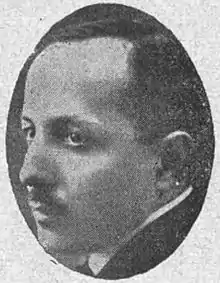Apolinary Hartglas
Maksymilian Apolinary Hartglas (7 April 1883 – 7 March 1953) was a Zionist activist and one of the main political leaders of Polish Jews during the interwar period, a lawyer, a publicist, and a Sejm deputy from 1919 to 1930.
Apolinary Hartglas | |
|---|---|
 Apolinary Hartglas | |
| Born | 7 April 1883 |
| Died | 7 March 1953 (aged 69) |
| Alma mater | University of Warsaw |
Biography
Maksymilian Apolinary Hartglas was born into a lawyer family from Podlasie. Between 1892 and 1900 he attended a secondary school in Biała Podlaska. Subsequently he earned a law degree from Warsaw University in 1904.[1] Between 1907 and 1919 he practiced law in Siedlce with an additional office in Warsaw.[2] While at the university he became involved with the Zionist movement and in 1906 he participated in a Zionist Helsingfors conference in Helsinki.[1]
After the Nazi invasion of Poland and German occupation he was made a member of the Warsaw Judenrat.[3]
In December 1939, he managed to escape to Trieste, Italy and immigrated to Palestine. He settled in Jerusalem. After the establishment of the State of Israel he served as a high ranking administrator in the Ministry of the Interior.[4]
Political career
In 1919 he was elected by constituents of Biała Podlaska as a deputy to the first Sejm of the newly independent Polish state which was charged with writing a new constitution. In all he served three terms as a delegate.[1][2] Before the elections of 1922 together with Yitzhak Gruenbaum he was a co-creator of Bloc of National Minorities, a parliamentary organization whose purpose was to represent ethnic minorities in the Polish parliament.[5] One of his first acts as a deputy of the Sejm was to introduce a law which annulled all Russian sponsored laws which discriminated against Jews in the former Congress Poland.[6]
In 1920 he took part in the Polish-Soviet War as a volunteer. Between 1938 and 1939 he was a member of the Warsaw City Council. During this time he published articles in "Głos Żydowski", "Tygodnik Żydowski" and "Życie Żydowskie" newspapers.[7]
Published works
In 1996, his memoirs were published posthumously in Poland under the title At the border of two worlds (Polish: Na pograniczu dwóch światów) (ISBN 978-83-86678-35-8), in which he described the social and political realities of Poland at the turn of the century, during World War I, and the interwar period. In the book he wrote:[8][9]
I called my memoirs “At the border of two worlds” not because I had in mind the world of today and the eternal ever existing world but for a much more mundane reason. I, myself as a human being found myself at a border of the Jewish world and the Polish world. To elaborate, throughout my whole life, two forces, difficult to reconcile, strove within me: a Polish childhood and upbringing, an attachment to the Polish nation, its culture and its soil together with a self formed love for the Jewish nation, its suffering and troubles and the hope of its rebirth in its own homeland. My whole life I suffered a split within myself since there is no power that could have fused these two different souls. I loved both nations as a man and I was at times critical and angry at both of them: as a Jew I could not forget the wrongs that my people sometimes suffered in Poland (personally I have not suffered these) and as one assimilated into the Polish culture I shared some of the grief that even the best of Poles occasionally had towards the Jews. (Translated from Polish)
See also
References
- Andrzej Krzysztof Kunert, Małgorzata Smogorzewska, ed. "Posłowie i senatorowie Rzeczypospolitej Polskiej 1919-1939. Słownik biograficzny, tom II: E-J" (Delegates and senators of the Second Polish Republic 1919-1939, Biographical Dictionary, Vol II: E-J), Warszawa 2000
- Jolanta Żyndul, "The Legal Practice of Apolinary Hartglas", Justice, The International Association of Jewish Lawyers and Jurists, No. 30, Winter 2002, pg. 45 Archived 2009-10-19 at the Wayback Machine
- Gutman, Yisrael; Friedman, Ina R. (1989). The Jews of Warsaw, 1939–1943. Indiana University Press. p. 17. ISBN 0253205115.
- Yad Vashem, "Pinkas Hakehillot:“Biala Podlaska” - Encyclopedia of Jewish Communities in Poland, Volume VII", pgs. 84-89.
- Gershon David Hundert, The YIVO Encyclopedia of Jews in Eastern Europe, Yivo Institute for Jewish Research and Yale University Press, 2008.
- Robert Blobaum, "Antisemitism and its opponents in modern Poland", Cornell University Press, 2005, pg. 150
- HOLOKAUST NA TERENIE REGIONU BIALSKOPODLASKIEGO: Życie społeczno - polityczne. Archived 2013-09-27 at the Wayback Machine
- Apolinary Hartglas, Na pograniczu dwóch światów, Warszawa Oficyna Wydawn. Rytm 1996 OCLC 37898215, ISBN 978-83-86678-35-8.
- Natalia Aleksiun, "Narratives under Siege: Polish-Jewish Relations and Jewish Historical Writings in Interwar Poland", The Stephen Roth Institute for the Study of Antisemitism and Racism, Tel Aviv University, 2003